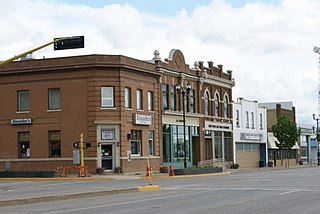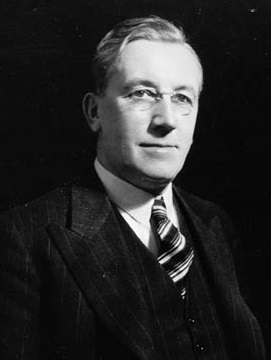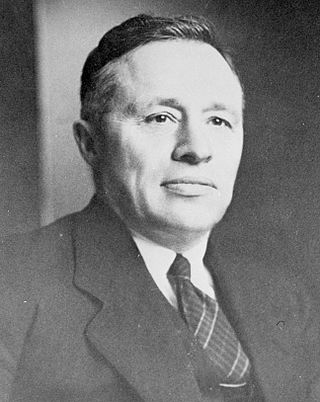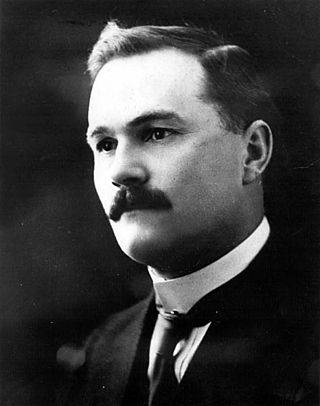Related Research Articles

Yorkton is a city located in south-eastern Saskatchewan, Canada. It is about 450 kilometres north-west of Winnipeg and 300 kilometres south-east of Saskatoon and is the sixth largest city in the province.

Walter Scott was the first premier of Saskatchewan from 1905 to 1916. Scott was Saskatchewan's second longest-serving Premier, serving one continuous term from 1905 to 1916). He led the Saskatchewan Liberal Party in three general elections, winning all three with majority governments before retiring. He was the first of six Liberal Premiers to date. He was succeeded by William Melville Martin. Scott was also the minister of various departments during his tenure as premier. Prior to the creation of Saskatchewan in 1905, Scott was a Member of Parliament in the federal House of Commons of Canada, elected in the general elections of 1900 and 1904.

The Saskatchewan Act, S. C. 1905, c. 42. is an Act of the Parliament of Canada which established the new province of Saskatchewan, effective September 1, 1905. Its long title is An Act to establish and provide for the government of the Province of Saskatchewan. The Act received royal assent on July 20, 1905. The Saskatchewan Act is part of the Constitution of Canada.
Wilbert Ross Thatcher, was the ninth premier of Saskatchewan, serving from May 22, 1964 to June 30, 1971. He led the Saskatchewan Liberal Party in four general elections, in 1960, 1964, 1967 and 1971. Thatcher was defeated in his first election in 1960, but won the next two elections in 1964 and 1967 with majority governments. Following his defeat in the general election of 1971, he retired from politics and died shortly afterwards.

Major James William Coldwell, usually known as M. J. Coldwell, was a Canadian democratic socialist politician, and leader of the Co-operative Commonwealth Federation (CCF) party from 1942 to 1960.

George Stewart Henry was a farmer, businessman and politician in Ontario, Canada. He served as the tenth premier of Ontario from 1930 to 1934. He had acted as minister of highways while Ontario greatly expanded its highway system. Henry continued the expansion as premier, but his party did not provide relief during the Great Depression and lost the 1934 election.

James Garfield Gardiner was a Canadian farmer, educator, and politician. He served as the fourth premier of Saskatchewan, and as a minister in the Canadian Cabinet.

William John Patterson was a Liberal politician and the sixth premier of Saskatchewan from 1935 to 1944. He was first elected to the Legislative Assembly of Saskatchewan in the 1921 election. He succeeded James G. Gardiner to become the province's first Saskatchewan-born premier.

Charles Avery Dunning was the third premier of Saskatchewan. Born in England, he emigrated to Canada at the age of 16. By the age of 36, he was premier. He had a successful career as a farmer, businessman, and politician, both provincially and federally.

William Melville Martin served as the second premier of Saskatchewan from 1916 to 1922. In 1916, although not a member of the Legislative Assembly of Saskatchewan, Martin was elected leader of the Saskatchewan Liberal Party, succeeding Premier Walter Scott and thus became Premier of Saskatchewan.
Yorkton was a federal electoral district in Saskatchewan, Canada, that was represented in the House of Commons of Canada from 1925 to 1968.
Highway 1 is the Saskatchewan section of the Trans-Canada Highway mainland route. The total distance of the Trans-Canada Highway in Saskatchewan is 654 kilometres (406 mi). The highway traverses Saskatchewan from the western border with Alberta, from Highway 1, to the Manitoba border where it continues as PTH 1. The Trans-Canada Highway Act was passed on December 10, 1949. The Saskatchewan segment was completed August 21, 1957, and completely twinned on November 6, 2008. The speed limit along the majority of the route is 110 kilometres per hour (70 mph) with urban area thoroughfares slowing to a speed of 80–100 kilometres per hour (50–62 mph). Portions of the highway—the section through Swift Current, an 8-kilometre (5 mi) section east of Moose Jaw, and a 44-kilometre (27 mi) section between the West Regina Bypass and Balgonie—are controlled-access. Highway 1 serves as a major east-west transport route for commercial traffic. It is the main link between southern Saskatchewan's largest cities, and also serves as the province's main link to the neighbouring provinces of Alberta and Manitoba.
Alexander Hamilton (Hammy) McDonald was a Canadian politician. Born in Fleming, Saskatchewan, he was the son of a Saskatchewan farm family and was the third generation of his family to farm in the Fleming area.

Politics of Saskatchewan relate to the Canadian federal political system, along with the other Canadian provinces. Saskatchewan has a lieutenant-governor, who is the representative of the Crown in right of Saskatchewan; premier, Scott Moe, leading the Cabinet; and a unicameral legislature.
Lyle Eldon Stewart is a retired Canadian provincial politician. A member of the Saskatchewan Party, he served six terms in the Legislative Assembly of Saskatchewan.

The Ministry of Highways is divided into the Operations, Policy and Programs, and Corporate Services Divisions and the Communications Branch. The ministry is the employer of over 1,476 employees diversified amongst 105 communities in Saskatchewan. The current Minister of Highways and Infrastructure is Fred Bradshaw.
George Hugh Castleden was a Co-operative Commonwealth Federation member of the House of Commons of Canada. He was born in Moosomin, Northwest Territories and became a teacher by career.
Ásmundur "Minty" Loptson He became a merchant, farmer, highway contractor and political figure in Saskatchewan. He represented Saltcoats from 1929 to 1934 and from 1948 to 1960 and Pheasant Hills from 1934 to 1948 in the Legislative Assembly of Saskatchewan as a Liberal. His surname also appears misspelled as Lopston in some sources.
Arthur Thomas Procter was a lawyer, judge and political figure in Saskatchewan. He represented Moosomin from 1934 to 1948 in the Legislative Assembly of Saskatchewan as a Liberal.
Vincent Reynolds Smith was a lawyer and political figure in Saskatchewan. He represented Yorkton from 1934 to 1938 in the Legislative Assembly of Saskatchewan as a Liberal.
References
- 1 2 3 Alan Carl Stewart – Parliament of Canada biography
- 1 2 Normandin, A L (1943). Canadian Parliamentary Guide.
- 1 2 3 Quiring, Brett. "Stewart, Alan Carl (1893–1958)". Encyclopedia of Saskatchewan. Archived from the original on 2011-08-26. Retrieved 2012-05-14.